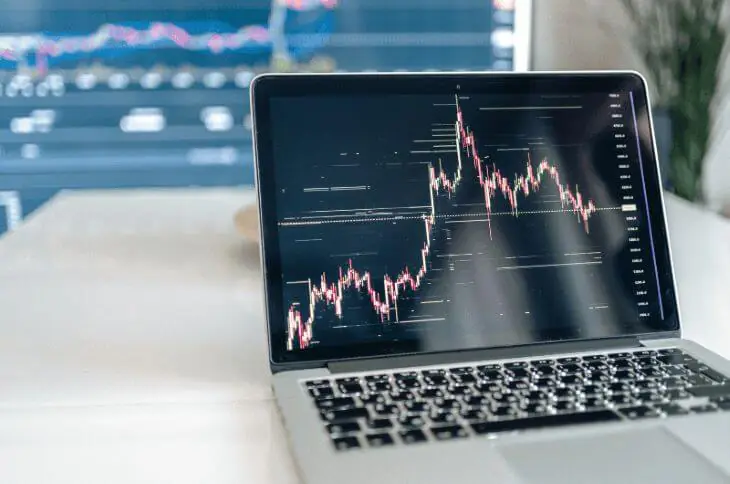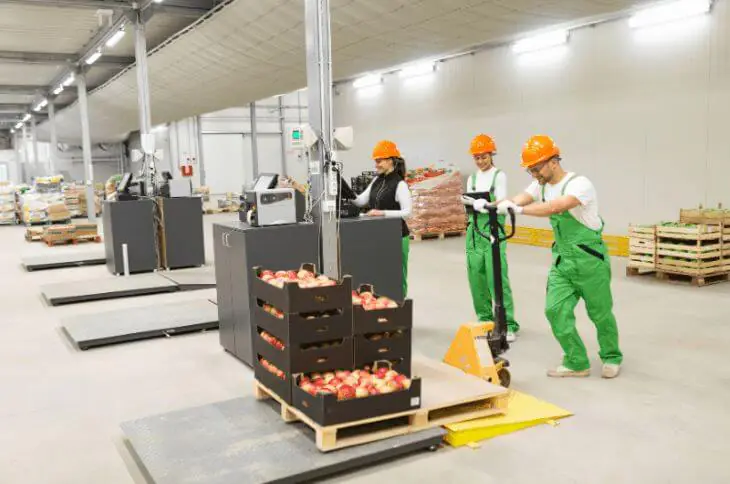Exploring Blockchain’s Potential: Revolutionizing the Supply Chain Thanks to Blockchain
Supply chains are essential to guarantee the smooth flow of goods from producers to consumers in the modern, globalized world. But there are many problems with this intricate network of procedures, like fraud, counterfeiting, and lack of transparency. These difficulties not only affect companies but also customers who depend on the reliability of the goods they buy. Blockchain technology has come to light as a potent remedy for these problems, providing unprecedented supply chain security and transparency.

Source: www.canva.com
What is Blockchain?
Distributed ledger technology, or blockchain, was first developed to support cryptocurrencies like Bitcoin. It functions as an immutable, decentralized database where information is kept in a series of blocks. These blocks comprise a history of information or transactions, and they are connected in a chain.
Imagine blockchain to be a digital record, similar to an incorruptible diary maintained among a group of friends. Each page in the journal is a block, and anything written or updated is added to the most recent page. No one can go back and modify what’s written after it’s been published, maintaining confidence and openness. This diary is duplicated and shared with everyone in the group, rather than being maintained at one person’s home. So, it’s not only safe but also a collaborative effort in record-keeping. Here are a few crucial characteristics of blockchain.
Decentralization
Blockchain has decentralized control as opposed to conventional centralized databases, which are controlled by a single party. This indicates that a copy of the ledger is held by numerous participants or nodes. A single point of failure is less likely thanks to this decentralization, which also improves security.
Consensus Mechanisms
Consensus techniques are used by blockchain networks to validate and add new blocks. The most popular one is called Proof of Work (PoW), in which users, often called miners, must solve challenging arithmetic problems to add new blocks. Proof of Stake (PoS) is a further consensus process in which validators are selected according to the quantity of tokens they possess.
Cryptography
Access to data can be controlled and transactions are secured with the use of cryptography. In addition to offering a degree of security and privacy, private and public keys are used for user authentication.
In which industries could we find Blockchain?
The potential of blockchain technology extends far beyond its use in cryptocurrencies, as you might not know. Beyond virtual currencies, blockchain’s flexibility has produced game-changing applications across a wide range of industries. Nowadays, the adoption of blockchain is minimal, but blockchain’s adaptability might transform industries globally. This can be anything from financial transactions to securely maintaining healthcare information as well as simplifying real estate procedures. Let’s examine the effects of blockchain on such areas.
1. Cryptocurrencies
The mother of blockchain. Blockchain technology powers digital currencies such as Bitcoin, Ethereum, and many more, allowing for peer-to-peer exchanges. Blockchain guarantees that these transactions are transparent and safe.

Source: www.canva.com
2. Finance
Blockchain technology has the power to completely transform the banking industry. It can be applied to cross-border payments, cutting down on the expenses and time involved in sending money internationally. Blockchain also makes it possible to issue digital assets like bonds and stocks.
However, it’s crucial to remember that, despite these benefits, blockchain technology adoption in the banking sector can necessitate legislative adjustments and industry-wide cooperation.
For example, cybersecurity. Blockchain improves security in many ways, but it is not impervious to new attacks. It might be necessary for the banking industry to work together to create strong cybersecurity procedures that complement blockchain’s special characteristics. Another example could be digital identity. Blockchain technology can make decentralized and more secure digital identity systems possible. Standardized, legally recognized digital identification standards and collaboration between banks and government agencies to guarantee data security and privacy may be necessary for the implementation of such systems.
3. Healthcare
Blockchain ensures patient privacy and data integrity while securely storing and exchanging medical records. Through the use of private and public keys, blockchain technology offers patient-controlled access to health data. Each patient has a distinct set of cryptographic keys, including a private key known only to the patient and a shared public key. When a healthcare professional or researcher seeks access to a patient’s data, the patient can provide permission by supplying the cryptographic keys required.
4. Real Estate
Blockchain transforms real estate by providing a decentralized, tamper-proof mechanism. A permanent ledger ensures transparent ownership records thus lowering the danger of fraudulent claims. Smart contracts automate procedures such as ownership transfers, reducing fraud and eliminating the need for intermediaries.
Property information on the blockchain, such as titles and legal papers, improves accessibility and reduces reliance on forgeable paper records. Immutable records ensure tamper-proof ownership and transaction history, lowering fraud risks dramatically. Moreover, blockchain reduces paperwork by using digital records.
What are smart contracts? Smart contracts are programs and protocols that define the principles and conditions for executing transactions between two or more parties. These rules are part of the smart contract, which guarantees blockchain transactions between two anonymous parties without the need for a central authority (intermediary) in which both parties would place their trust.

Source: www.canva.com
5. Public Administration
Blockchain technology is crucial to the digital transformation of the public sector in terms of streamlining administration, leading to a reduction of costs and time. Moreover, it raises the bar for service accessibility, security, dependability, and transparency.
One of the great examples is the voting system. Blockchain improves electronic voting systems by providing an immutable record that prevents tampering with votes. Because of its transparency, all participants can independently verify the voting process, lowering the possibility of manipulation.
Cryptographic techniques protect voter identities while reducing unauthorized access and fraud. Smart contracts automate verification, verifying eligibility, and properly tallying outcomes. While encryption ensures voter anonymity, blockchain’s resistance to tampering makes it very secure. Despite limitations like accessibility and usability, blockchain is an attractive technology for enhancing the integrity of electronic voting systems.
What about a Blockchain in the Supply Chain?
There are many technologies that upgrade the supply chain to another level, but blockchain technology is the driving force behind the impending dramatic shift in supply chain management.
The five main aspects of blockchain’s influence on supply chains—immutability, transparency, smart contracts, traceability, and real-time data—will be discussed in this section. All these elements work together to create a supply chain network that is safer, more effective, and more transparent. It’s critical to comprehend the main issues facing supply chain management today before delving into the answers offered by blockchain technology.
These difficulties consist of the following:
Counterfeiting
The Organization for Economic Co-operation and Development (OECD) estimates that 3% of worldwide trade is made up of products that have been counterfeited or pirated. In addition to hurting respectable companies, counterfeit goods can seriously endanger the health and safety of customers.
Lack of Transparency
The opaque nature of traditional supply chains make it challenging to follow the path of goods from their point of origin to their final destination. This opacity may result in vulnerabilities and inefficiencies.
Fraud and Errors
Transactions in the supply chain are prone to fraud and human mistakes. Right now, there is a big chance that blockchain technology will improve data accuracy in the supply chain industry. Experts in the field estimate that between 35 and 40 percent of the data in the current supply chain systems can be erroneous or defective (supplychaindive.com, 2019). Both monetary losses and interruptions to operations may result from this.
Inefficiencies
Supply chain inefficiencies lead to increased expenses, hold-ups, and waste. These inefficiencies are made worse by the absence of real-time data and coordination.
Now let’s examine how blockchain technology is changing how we oversee the movement of goods from producer to customer:
- Immutability: A block cannot be removed or changed once it has been added to the chain. This characteristic guarantees data integrity and fosters participant trust.
- Transparency: Blockchain technology offers a shared ledger that is available to all authorized supply chain actors. Transparency promotes accountability and trust.
- Traceability: Despite the many ways you can trace shipping containers, until now, there were no ways to trace products themselves. Thanks to blockchain technology, every step of the supply chain may be followed for products, making it possible to quickly identify problems.
- Real-time Data: Blockchain enables real-time data exchange, which enhances collaboration and decision-making.
Use blockchain in your company
Using blockchain technology to secure your transportation services requires a smart and precise strategy. The mentioned fundamental characteristics of blockchain above can dramatically improve the security and efficiency of your operations. Here’s why you should use blockchain to make your transportation services as secure as possible.
Using blockchain offers trust and an unforgeable record of transactions by generating a shared ledger available to all authorized participants. This transparency is critical in combating counterfeiting, lowering the danger of fake items invading the supply chain, and protecting the integrity of transported products.
Additionally, the use of blockchain improves security by giving an immutable and immediately available history of each product’s path. This increased exposure discourages malevolent activity, establishing a climate of accountability and trust among stakeholders. Blockchain transparency ensures that every participant may verify the validity and origin of transported items, strengthening the overall security framework of your transportation services.
Thanks to Smart contracts, you can automate and secure agreements in your transportation procedures. They enforce preset criteria, ensuring that terms are followed before moving on to the next stage of the trip. Smart contracts do away with the need for middlemen, lowering the risk of fraud and conflicts. Get inspired by other companies that have started to use blockchain already.

Source: www.canva.com
Why and how are Companies using Blockchain nowadays?
Many businesses are using blockchain technology to improve and protect their supply chain procedures. Blockchain is becoming a solution for issues like halting the spread of fake goods, enhancing transparency, tracing the provenance of products, and boosting overall operational efficiency.
Prevent Counterfeiting
In many industries, counterfeiting is a serious problem, but blockchain provides a strong defense against this problem. A World Health Organization survey claims that up to 10% of medications on the market today are fake. Pharmaceutical companies such as Pfizer have teamed up with blockchain providers to track and confirm the legitimacy of their products. Companies hope that the use of blockchain will bring counterfeit to a minimum.

Source: www.canva.com
The automobile sector must deal with the problem of fake parts, which can reduce performance and safety. Manufacturers and a startup named VeChain have teamed up to use blockchain technology. This has lessened the occurrence of fake automotive parts by allowing consumers to confirm the legitimacy of auto parts.
Another great example are luxury brands such as Louis Vuitton use QR codes or RFID tags to assign a unique identity to each object, which purchasers can scan with a blockchain-based app or website. This direct verification retrieves unchangeable data from the blockchain, illustrating the product’s journey from manufacturing to sale. Because blockchain is decentralized and tamper-proof, consumers obtain accurate and trustworthy information about the product’s origin, fighting the market for counterfeit luxury items and building faith in the brand’s dedication to authenticity.
Enhance Transparency
For several reasons, including sustainability and ethical sourcing, supply chains must be transparent. Blockchain technology is being used by businesses like De Beers and Everledger to track the provenance of diamonds and make sure they are not “blood diamonds” that are used to fund war. As a result, the diamond supply chain is more transparent.
The use of blockchain technology in the food business improves transparency by enabling consumers to access real-time information about the sources of the food they buy, while also speeding up the process of tracking down tainted products. In addition to bolstering consumer confidence, this extra layer of openness acts as a preventative step against potential foodborne illnesses. Walmart and IBM have partnered to use blockchain technology to track the provenance of food items. Because of this, contaminated products can now be recalled more quickly, protecting customer safety.

Source: www.canva.com
Environmental impact, child labor, and ethical sourcing are all problems in the cocoa supply chain. Blockchain technology is being used by businesses like Hershey and Barry Callebaut to track the path of cocoa beans from farm to customer. This improves transparency and guarantees that cocoa is obtained ethically and produced responsibly.
Increased Efficiency of Supply Chains
The application of blockchain has resulted in significant efficiency gains. Maersk, a prominent global shipping company, and IBM collaborated to develop a blockchain-based platform designed for the management of worldwide supply chains. They claimed a 20% decrease in shipping and logistics expenses, which they mostly credited to blockchain’s increased efficiency and transparency.
Walmart ran a trial effort in 2018 to use blockchain technology to track the path of a package of sliced mangoes. It took just 2.2 seconds to locate the mangoes’ origin. The speed at which a task that would usually take almost a week was completed, demonstrating the usefulness of blockchain technology in supply chain management.

Source: www.canva.com
One of the biggest online retailers in the world, Amazon, is using blockchain technology to improve supply chain effectiveness, save operating costs, and increase order accuracy.
If you are interested in new technologies but blockchains seem to be a nut too hard to crack, we would recommend you try a load planning software like EasyCargo. It is an effective tool for loading shipping containers thus saving transportation costs. It helps companies maximize space usage and enhances supply chain efficiency by optimizing the packing and loading of cargo into containers, pallets, or trucks.




